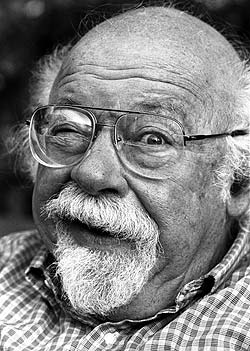Retired professor Jesse Rabinowitz dies at 78
 Photo by Raphael Shevelev/A Thousand Words |
A professor emeritus of molecular and cell biology at UC Berkeley, Rabinowitz "was one of our great teachers," said biochemist Clint Ballou, a UC Berkeley professor emeritus of molecular and cell biology.
Rabinowitz spent his career tracking down, identifying and characterizing the enzymes that require folic acid to function, a role that makes the vitamin an essential micronutrient in the diet. All pregnant women are now advised to take folic acid, or folate, to prevent spina bifida and other neural tube defects in newborns. Folic acid deficiency also has been linked in various studies to an increased risk of heart disease, cancer and various types of brain dysfunction.
"Jesse worked out a good part of the basic biology of folic acid," said close friend and biochemist Bruce Ames, professor emeritus of molecular and cell biology at UC Berkeley and a researcher at the Children's Hospital Oakland Research Institute. "In our research on chromosome breaks, we keep coming across Jesse's old work. All his papers are classics."
According to Ames, without folic acid and the coenzyme it is converted to, tetrahydrofolate, some of DNA's building blocks are put in the wrong place, and DNA strands can break and fall apart. Without proper repair, this can lead to chromosome mutations and cancer.
The biochemistry of folic acid has grown tremendously in importance in recent years because several major anti-cancer drugs work by interfering with folic acid, said another long-time friend of Rabinowitz's, Edward Penhoet, former UC Berkeley professor of biochemistry, former dean of the School of Public Health, co-founder of Chiron Corporation and now director for science and higher education programs at the Gordon and Betty Moore Foundation.
Rabinowitz also explored the biochemistry of iron-sulfur proteins like ferredoxin. Most of his work was conducted in bacteria.
Rabinowitz also was an avid photographer, particularly of people, and his friends got together in his last months to publish a book of his color photos, most of them of people he encountered on his world travels. A member of the Berkeley Camera Club, he frequently showed his photos at galleries around the Bay Area, and entered numerous photo contests, including Saturday Review magazine's 1969 World Travel Photography Contest, in which he won the Grand Prize in Color.
|
Rabinowitz left his extensive collection of color slides, numbering in the thousands and meticulously organized, to the Special Collections Department of the McHenry Library at the University of California Library, Santa Cruz. The library plans to make portions of the Rabinowitz archive available online.
"He was a true devotee of culture. Science, art, music, literature - all interested him," Penhoet said. "Without a doubt he was the most complete example of a Renaissance man I've ever known."
A native of New York City, Rabinowitz was born April 28, 1925, and obtained his bachelor's degree in chemistry from the Polytechnic Institute of Brooklyn in 1945. Following graduate studies at the University of Wisconsin, Madison, where he earned a PhD in biochemistry in 1949, he took a post-doctoral position at UC Berkeley before joining the National Institute of Arthritis and Metabolic Diseases, part of the National Institutes of Health, as a chemist in 1953. He left the NIH in 1957 to return to UC Berkeley as a member of the biochemistry department faculty, from which he retired in 1991. He served as chair of the Department of Biochemistry from 1978 to 1983.
He had definite ideas about how biochemical research should be conducted, and he taught a legendary course to all first-year graduate students that rigorously introduced them to his approach.
"He was extremely devoted to students, and had a profound influence on the whole department," Penhoet said.
Rabinowitz was a member of the National Academy of Sciences and a fellow of the American Society for Microbiology
Aside from Rabinowitz's broad cultural interests - he was a season ticket holder at the San Francisco Opera for more than 45 years and a devoted cellist - he also loved to travel, was a terrific cook, an agile Scottish country dancer and a lively and popular dinner guest.
Rabinowitz leaves no survivors, and there are no plans for a memorial service. Donations in his memory can be made to the Division of Biochemistry, Department of Molecular and Cell Biology, 597 Life Sciences Addition #3200, University of California, Berkeley, CA 94720-3200.


 Jesse
Rabinowitz, Kabah, Mexico, 1969
Jesse
Rabinowitz, Kabah, Mexico, 1969